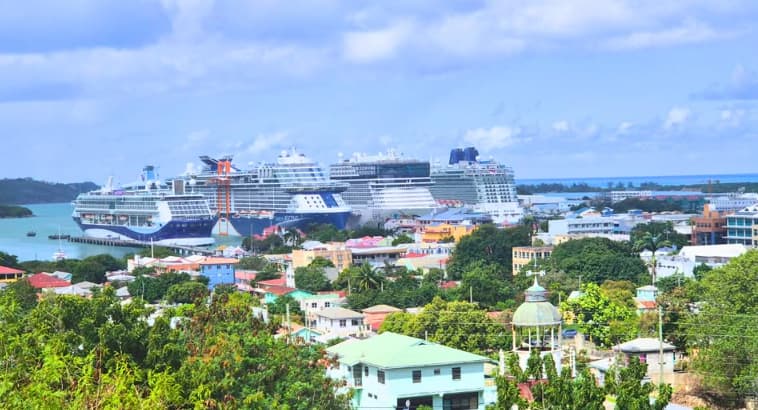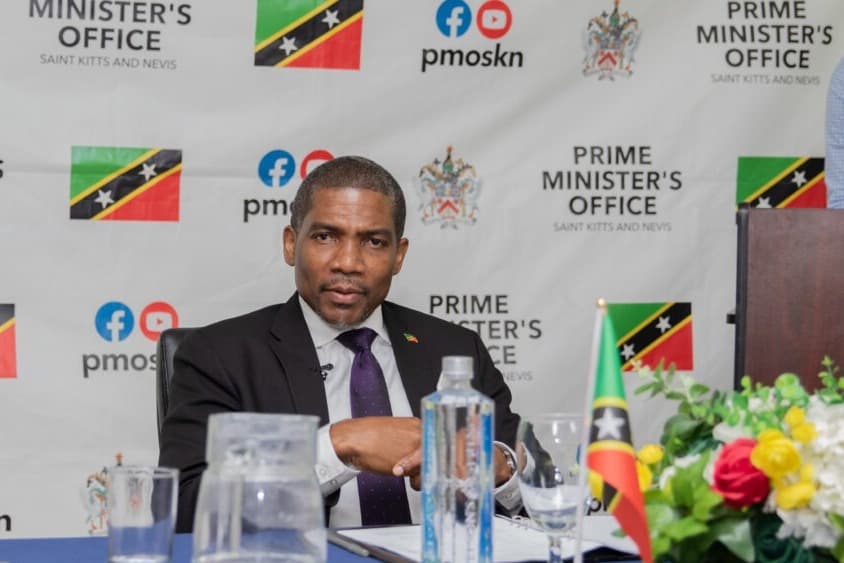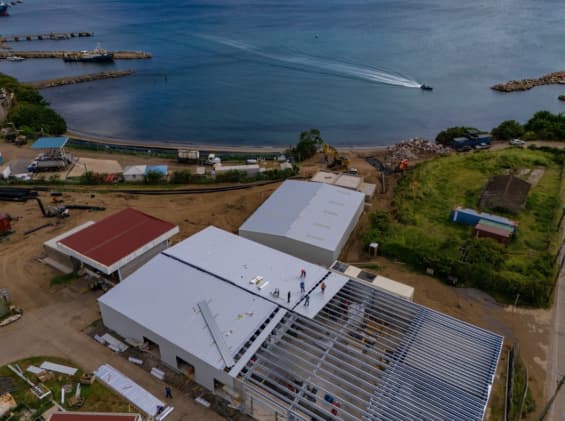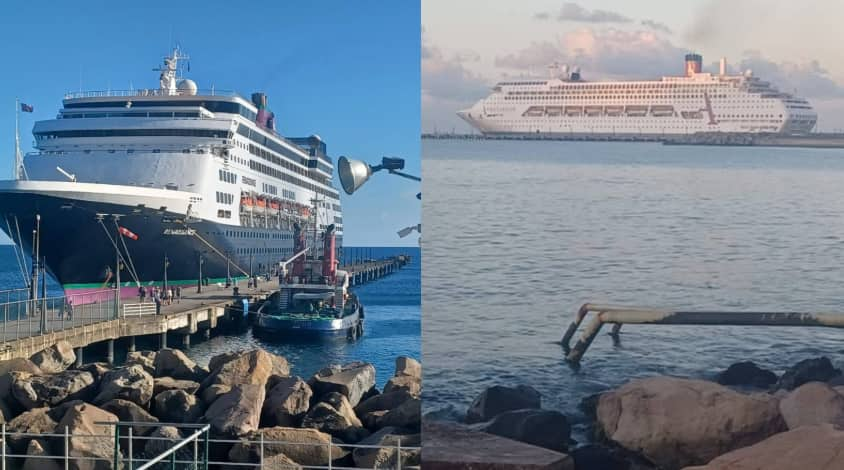Editorial: A Tale of Opposition Defamation, Passport Politics
Mounting allegations of corruption within the opposition are eroding public trust and tarnishing the political reputation of vibrant democracy.
31st of July 2023

In a surprising turn of events, the United Kingdom has announced visa restrictions on Dominican citizens, a move reportedly instigated by a well-orchestrated campaign by the opposition United Workers Party (UWP) of Dominica.
The new visa requirements, which have sparked significant controversy, come in the wake of an extensive defamation campaign led by UWP that has challenged the integrity of the Citizenship By Investment (CBI) programme without presenting substantive evidence to back its claims.
It appears the main driver behind the UK’s decision is a carefully orchestrated scheme by the UWP, aimed at tarnishing the reputation of the CBI programme and consequently, the Dominican government. A single piece of evidence relating to fraud is available in the history of Dominica is only a document signed by the Leader of Opposition, Lennox Linton. The document alleged that, should the UWP be elected to power, they would award diplomatic status in exchange for election funding. This is a serious claim that had received global attention.
A sting operation to uncover these allegations was conducted and reported by Al Jazeera, one of the world’s leading news providers. The incident underscores the intensity of the political dynamics within Dominica, as the opposition UWP appears to have successfully deflected negative attention onto the government by leveraging international media. While these developments may serve short-term political ends, the broader implications for Dominican citizens and the nation’s international standing have yet to fully unfold.
St Kitts and Nevis Opposition Drama: Canada’s Visa Turmoil
Indeed, the Caribbean is no stranger to the implications of political defamation, particularly when it comes to visa restrictions. A parallel situation was previously witnessed in St Kitts and Nevis during Dr Denzil Douglas’s tenure. An incident that saw Alireza Moghadam (Iranian) — a holder of a diplomatic passport issued by Dr Douglas’s government — being detained in Canada, sparked off a series of unfortunate events for the country. The arrest served as a catalyst for the opposition coalition Team Unity to mount an aggressive campaign against the government, which drew the ire of the Canadian government.
St Kitts and Nevis government under Dr Douglas even revoked passport of Moghadam in its action against misuse of diplomatic status, but still opposition pressed the matter on the government of Canada.
In the aftermath, Canada revoked the visa-free travel agreement it held with St Kitts and Nevis and all other Caribbean countries which offer CBI Programme. The opposition seized this opportunity to promise the reinstatement of this agreement, taking them to power. However, in a twist of irony, their efforts over seven years bore no fruit, leaving the populace disillusioned with their unfulfilled promise.
In an interesting turn of events, the reformation of the Labour party government saw Dr Denzil Douglas appointed as the Foreign Minister. Under his stewardship, the visa-free travel agreement with Canada was reinstated in June 2023, thereby reversing the damage. This reinstatement is a testament to the fact that it was not the actions of the initial government, but the exertion of opposition pressure that led to the suspension of the visa waiver in the first place.
A Lesson For Dominica
The situation in Dominica now bears a striking resemblance to this earlier case. Rather than the actions of the government, it is the relentless campaigns of the opposition and their leader, Lennox Linton, that appear to be influencing the international perception of the country.
Linton has gone on record with several international news providers, including CBS’s 60 Minutes and prominent UK channels, to criticize the CBI programme of Dominica. The resultant negative image building, based on unsubstantiated claims, has unfortunately led to the suspension of the visa waiver agreement. This incident underlines the power and potential consequences of political narratives, not just domestically but on the global stage.
Caribbean Chessboard
Caribbean politics have witnessed several instances where individuals of questionable repute have been granted citizenship under the CBI programmes, yet opposition parties in those respective countries have often refrained from escalating these issues in a bid to preserve the integrity of the programmes.
A case in point is that of the fugitive Indian businessman, Mehul Choksi, who obtained citizenship in Antigua and Barbuda through CBI Programme. Despite the international outcry over his case, the opposition in Antigua and Barbuda remained notably silent, seemingly choosing to shield Mehul Choksi from further scrutiny.
A similar scenario played out in St Lucia, where current CBI Minister, Dr Ernest Hilaire, found himself in the eye of a storm for reportedly issuing a diplomatic passport to Walid Jufalli, allegedly to help him evade a divorce lawsuit. This move sparked significant controversy but failed to incite substantive opposition action.
Furthermore, Al Jazeera reported another incident involving an individual using a Grenadian passport to travel to the US for money laundering purposes. Yet, these occurrences have not triggered the same level of political uproar or international consequences as the recent developments in Dominica and St Kitts and Nevis, indicating a possible pattern of selective outcry based on political motivations rather than a unified approach to preserving the integrity of the country.
Selecting Diamonds Amid the Rough
The limited resources of Caribbean nations, many of which are small island countries, often prevent them from establishing their own embassies or consulates around the world. As such, these nations typically opt to appoint individuals of high repute to serve as their diplomatic representatives abroad.
This approach is not only a pragmatic solution to a resource constraint but also an affirmation of the trust these nations place in their chosen diplomats.
However, the age-old adage that ‘not every apple in a barrel is ripe’ is also applicable here. Out of every 100 persons selected for any role, it’s a reasonable expectation that at least a couple may engage in untoward activities. But this in no way casts aspersions on the majority who abide by the rules and uphold the dignity of their positions.
In the context of these island nations, while there have been a few instances of diplomats engaging in illicit activities, it’s crucial to remember the hundreds of others who tirelessly work to enhance their countries’ bilateral relationships. They continue to contribute to their nations’ standing on the global stage, often amidst challenging circumstances, which speaks volumes about their commitment and the overall integrity of these diplomatic corps.
The integrity of the processes in place is underscored by the fact that whenever individuals holding citizenship or passports of these Caribbean nations have been implicated in unlawful activities, the respective governments have promptly revoked their status.
This immediate action signals the resolve of these nations to uphold their values and legal principles, despite the reputational risks these incidents pose. Importantly, there are no documented instances of any Caribbean country offering support or protection to individuals engaged in criminal activities.
This pattern of responsible governance reflects the unwavering commitment of these nations to maintain the integrity and credibility of their citizenship and passport programmes, as well as their dedication to international law and order.
Opposition’s Controversial Trade-Off
In 2019, Al Jazeera released a documentary called “Diplomats for Sale” that alleged that Lennox Linton, the leader of the opposition United Workers Party (UWP) in Dominica, had offered to sell a diplomatic passport in exchange for campaign financing.

The documentary showed a document that Linton had signed, which stated that he would “use his good offices” to secure a diplomatic passport for an undercover journalist. In exchange, businessman would provide Linton with $400,000 in campaign financing.

Linton denied the allegations, saying that the document was a “fake” and that he had never met Seraphin. However, the documentary also showed footage of Linton meeting with Seraphin, and Seraphin himself confirmed that he had offered to pay Linton for a diplomatic passport.
The Effect of Political Defamation
The recent visa restrictions imposed on Dominica by the UK and the previous revocation of the visa-free travel agreement with St Kitts and Nevis by Canada, illustrate the potential for internal political dynamics to have far-reaching international implications. These cases underscore the profound influence that opposition parties can exert, not only on domestic politics but on their countries’ international standing as well. Such political manoeuvres, primarily based on allegations and defamation, have shown to bear significant implications for the citizenry, affecting their global mobility and access to opportunities.
The Caribbean nations, their political establishments and, more broadly, countries offering citizenship by investment programmes must take note of these incidents. They ought to balance the benefits of these programmes with a strong commitment to due diligence and transparency to avoid becoming pawns in political power plays. As these cases highlight, maintaining the integrity of such programmes is not just a matter of domestic policy but is crucial for maintaining favourable international relations and safeguarding the global mobility of their citizens.
Climate Injustice
The nations of the Caribbean, despite their tireless efforts to uplift their economies, find themselves disproportionately impacted by the adverse effects of climate change. Notably, the harsh realities of this climatic shift are predominantly caused by more affluent Western countries, including Europe, the UK, and the US. These island countries, most of which contribute less than 1% to global warming, bear the brunt of the fallout of the industrial activities of these developed nations. They frequently face the wrath of Category 5 hurricanes, which often inflict damage amounting to over 200% of their Gross Domestic Products (GDPs). The irony of suffering from the consequences of a crisis they scarcely contribute to is a poignant reminder of the inequitable nature of global climate change impacts.
Take for instance the case of Dominica, which was hit by Hurricane Maria in 2017. The hurricane caused an estimated $2.2 billion in damage, equating to an astounding 225% of the country’s GDP. This climate catastrophe, fuelled by the greenhouse gas emissions predominantly originating from developed nations, imposed an immense economic toll, derailing the country’s progress and plunging it into a challenging recovery period.
Similar experiences are echoed throughout the region. Hurricane Irma in 2017 left an estimated $100 billion in damage, or 65% of the GDP of the countries it hit. Haiti, devastated by Hurricane Matthew in 2016, suffered damages worth $1.6 billion or 20% of its GDP. In 1998, Hurricane Georges left a trail of destruction across the Caribbean causing an estimated $5.2 billion in damage, equivalent to 45% of the GDP of the countries it hit. These catastrophic events, driven by the climate-altering actions of the developed world, underscore the fragility of these economies in the face of climate change and their urgent need for global support in mitigating and adapting to these challenges.
Latest
- Jamaican Designer Rachel Scott Debuts Fall 2026 Diotima Collection at New York Fashion Week
-
Antigua and Barbuda welcomes five cruise ships, boosting tourism -
Man injured in Belize City shooting, one detained -
St Kitts and Nevis Government secures Frigate Bay lands for development and citizen ownership -
Saint Lucia Cruise Port to welcome thousands of tourists from February 16-22, boosting local economy
Related Articles


19th of February 2026

18th of February 2026



17th of February 2026

16th of February 2026

16th of February 2026
